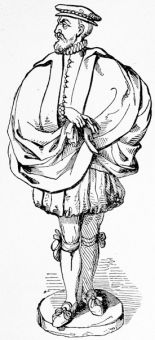
St Bartholomew's Day Massacre
But again [in 1572] the situation was changed by an appalling tragedy. France was apparently on the verge of a religious settlement. Huguenot influence was predominant, and the Bourbon Henry of Navarre, the Huguenot figureÂhead, and heir to the crown after the king's brothers, was about to marry the king's sister. There was a vast gathering of Huguenots in Pars for the celebration of the wedding, which took place on August 18th. Six days later the streets of Paris were running red with the blood of the victims of the massacre of St. Bartholomew.
The possibility of a French marriage for Elizabeth for the time being vanished completely; to the disappointment of Elizabeth's ministers, who had hoped by means of it to secure France as a Protestant force in European politics. Indeed, whether she were Catholic or Protestant, France's political interests were so vitally antagonistic to those of Philip that even after St. Bartholomew, Orange would have accepted a French protectorate as the price of French aid when he despaired of definite assistance from England.
In the revulsion aroused in England by the massacre, Philip found his opportunity for reviving an appearance of amity with Elizabeth, in order to deter her from active intervention on behalf of the Netheriand Protestants. Alva, by his own wish, was recalled from the Netherlands, and a governor whose methods were less drastic took his place. The southern provinces were detached from the revolt by proposals for meeting their constitutional demands as distinct from the religious demands of the northern provinces.
Popular sympathy in England remained with Orange, but Elizabeth's personal views were antagonistic to the encouragement of subjects who declined to have their religion dictated to them by their legitimate sovereign. In plain terms, her sympathies as a ruler were with Philip, though she felt the political expediency of fostering the forest which held him in check. She could not afford to allow the Protestant provinces to be crushed completely, but she would give them no more than just enough help to preserve them from destruction, and that help was given grudgingly and secretly.
And so she and Philip, each privily seeking to damage the other as much as possible, both publicly insisted on their desire for a reÂconciliation and an adjustment of the grievances of which the two countries complained. At the same time neither had the slightest intention of conceding what the other most strongly insisted on, Elizabeth demanding for English sailors in Spanish ports immunity from the claims of the Inquisition, to seize them as heretics, while Philip demanded the suppression and punishment of the seamen whom he regarded as pirates.
Still the mutual protestations of goodwill seemed to be quite promising when, for the first time since the Ridolfi plot, a Spanish ambassador, Bernardino de Mendoza, appeared in England in 1578. The time, however, was at hand when the papacy and the Jesuits were to take up the business of attacking England.
Scotland
In the meanwhile Scotland was enduring the government of regencies in the name of the child James VI. Moray ruled with vigour and ability, but eighteen months had hardly passed since Langside when he was assassinated. After that came chaos, which after a considerable period issued in the predominance of Morton, who became regent at the end of 1572. It was not till then that that party among the nobles who had attached themÂselves to the scheme of restoring Mary to the throne was definitely crushed. For six years Morton remained supreme, enforcing the law with a strong hand, and with justice except when injustice was better suited to his personal interest.
But such rule was popular with no class of the community. He was a political Protestant who would by no means countenance the claims of the Calvinistic clergy to assume the position of the prophets of Israel. The government needed money, and its exactions fell heavily on the common people. The nobles wanted to go their own way, whereas Morton made them go his.
In 1578 he realised that he had brought together such a formidable combination of enemies that he resigned the regency; but the chaos which immediately followed soon enabled him to recover a brief ascendency, which was again broken down through the appearance in Scotland of the king's cousin, Esme Stewart or D'Aubigny, who was now the male representative of the Lennox Stewarts.
This article is excerpted from the book, 'A History of the British Nation', by AD Innes, published in 1912 by TC & EC Jack, London. I picked up this delightful tome at a second-hand bookstore in Calgary, Canada, some years ago. Since it is now more than 70 years since Mr Innes's death in 1938, we are able to share the complete text of this book with Britain Express readers. Some of the author's views may be controversial by modern standards, particularly his attitudes towards other cultures and races, but it is worth reading as a period piece of British attitudes at the time of writing.
History
Prehistory - Roman
Britain - Dark Ages - Medieval
Britain - The Tudor Era - The
Stuarts - Georgian Britain - The Victorian Age
